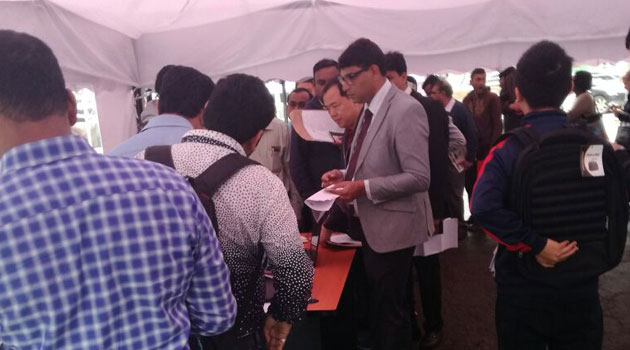
The Chinese were arrested in an ongoing crackdown against illegal immigrants sanctioned by Interior Cabinet Secretary Fred Matiangi/file
NAIROBI, Kenya, Sep 5 – National Police Service (NPS) Inspector General Joseph Boinnet has confirmed the release of 13 Chinese nationals arrested in a probe over their immigration status.
The 13 who were picked up by police at the China Global Television Network (CGTN) hub in Nairobi were according to Boinnet freed after their immigration status was verified.
In a brief statement to newsrooms, the Chine Embassy in Nairobi regretted the incident saying the matter had been escalated through diplomatic channels.
“Several such events happened recently. The Chinese Embassy is expressing its concern to Kenyan side through diplomatic channel,” the embassy stated.
The embassy said it requires all its citizens residing in Kenya to abide by the law, saying the 13 nationals arrested at the CGTN had legal working status.
“The embassy deems that the Chinese nationals who hold legal residence and working permits should not be detained,” the statement from the Chinese embassy further read.
The arrests are in light of an ongoing crackdown on illegal immigrants sanctioned by Interior Cabinet Secretary Fred Matiangi.
Matiangi had ordered the crackdown on July 30 following the conclusion of a two-month work permit verification exercise on July 22.
According to the interior ministry a total of 3,434 foreigners failed to authenticate their work permits in the verification exercise that begun on May 22.
The ministry said at the time 26,829 work permits had been verified with an additional 2,760 accounted for as the exercise ended.
The 2,760 work permits were however not verified since the respective holders were not available to authenticate their status.
“These 2,760 work permits were not verified due to various reasons such as unavailability of permit holders because of illness or travel,” Matiangi said in a statement on July 30.
Following the verification exercise informed by a commitment by the government to root out foreigners working in the country illegally, the Department of Immigration Services (DIS) announced a number of reforms including plans to establish a digital registry where details of foreign workers will be stored.
DIS also laid out elaborate measures to improve the process of applying for work permits.
Under new guidelines, applicants will request for work permits ahead of their arrival in the country and will only be allowed entry once their applications are granted.
DIS will also formulate strict penalties to deter foreigners from working in the country without requisite permits.
The work permits verification process had by July 3 resulted in the arrest of three brokers linked to a syndicate extorting unsuspecting foreigners seeking work permits with the promise of getting them the documents.
“We will continue to hunt down for more brokers because the Department of Immigration Services does not need such people to facilitate the processing of papers,” Matiangi said when he issued a status update at the time.
According to the CS, a total of 31 fake work permits had been detected.
Matiangi said foreigners found to have been in the country illegally are being processed for deportation with a multi-agency team tasked with the mandate of planning the expulsions.
He, however, said that the ministry was drafting a piece of legislation that would compel deportees to meet their travel costs in a bid to cut government expenditure on deportations.
“The proposed amendments would save us from spending sometimes up to about Sh500 million annually to deport people,” Matiangi noted.
At the onset of the work permit registration exercise, the number of foreigners cleared to work in the country had been estimated at 34,000 albeit concerns of aliens exploiting tourist visas to gain access to the country’s job market without seeking work permits.








































